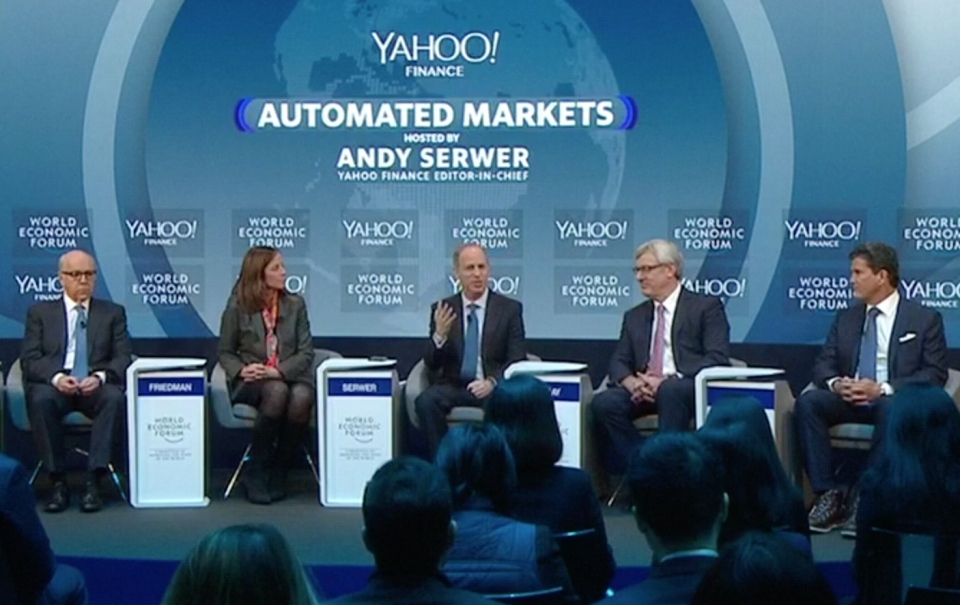Dissecting Davos: Royal Bank’s CEO on what defined the summit

Justin Trudeau, Donald Trump, Vladimir Putin, and Theresa May skipped the 2019 World Economic Forum, better known by its Swiss ski resort shorthand. And chances are, you didn’t make it to Davos this year either.
Luckily, Royal Bank of Canada’s (RY.TO) David McKay did. The president and chief executive of Canada’s biggest bank jotted down some thoughts about his fourth visit to the prestigious gathering of the global elite.
Here are some of the key takeaways:
CHINA
The leaders of the two largest economies were nowhere to be seen, but the escalating tension between the United States and China was difficult for the Davos crowd to ignore.
McKay found attending business leaders expressed quiet confidence the dispute between the global powers would be resolved in the next few months. But the broader rivalry between the countries is another matter.
“The Chinese came in force to Davos, with a clear message that they will not be subjected to Washington’s worldview,” McKay wrote. “They see themselves indisputably as the world’s No. 2 economic power, on their way to No. 1, and believe it’s up to the West to adjust.”
5G
The next generation mobile technology promises to usher in an era of ever-present, lightning-fast data that flows like electricity, powering self-driving cars, delivery drones, and digitally-enabled appliances. However, McKay found the Davos set wasn’t fully up to speed.
“I found it intriguing that despite the buzz, many of the world’s business and government leaders seemed to know little about 5G,” he wrote.
McKay said there’s little doubt that Huawei Technologies is a leader in the space, and questioned if nations who shut out the Chinese telecom giant over fears of state ties will be left behind.
BREXIT
British Prime Minister Theresa May was among the high-profile leaders who skipped Davos. Residents of her country are reportedly stockpiling food ahead of another crucial vote in Parliament on Tuesday.
McKay recalled a session in Davos where 90 per cent of the hands in the room shot up when asked who would be in favour of a second referendum on Brexit. He said about 300 people were in attendance, and the preference was for the U.K. to remain in the European Union.
GLOBAL COOPERATION
Foreign Affairs Minister Chrystia Freeland and German Chancellor Angela Merkel issued warnings about the threats to the rules-based international order, as well as efforts to subvert democracy and market capitalism.
For McKay, those risks underscore the importance of groups like the World Trade Organization (WTO).
“The WTO is the central plumbing of global commerce, connecting 400 preferential trade agreements and 3,000 investment deals, and yet it’s been stripped in recent years of its ability to function normally,” he wrote. “It’s one reason global trade has been plugged up since the financial crisis.”
DISTRUST AND DISCONTENT
The release of the 2019 Edelman Trust Barometer coincided with the start of this year’s summit. The survey of 33,000 people in 27 markets did not paint a rosy picture of the institutions in the hands of Davos attendees.
Most respondents predicted they would not be better off in five years time. In Canada, only one-third said they believe the future would be brighter.
“We used to count on good public schooling, workplace security, decent pensions, accessible healthcare and affordable housing. But in many countries, a career is now a series of gigs, the price of education is soaring, and housing is beyond the reach of many young workers,” McKay wrote. “Small wonder we’re seeing so much disquiet and its political cousin, populism.”
MACHINES IN THE MARKETS
To what extent was the market rout of late 2018 driven by automation? It’s a pressing question, given that more investors are turning to passive investments such as Exchange-Traded Funds rather than picking stocks themselves.
“It’s a popular and positive trend, as it gives small investors a more level-playing field
with the big ones. It also carries some long-term risks,” McKay wrote. “In many cases, that
means there are fewer buyers and sellers of stocks. As market automation isn’t likely to slow, financial institutions will need to continue to find ways to help clients navigate those shortfalls in liquidity and any ensuing volatility.”
ENERGY
McKay notes climate changes is the number one risk on the minds of Davos attendees a decade after then-British Prime Minister used the forum to press leaders to take action on the issue.
Three of the top five risks identified the World Economic Forum’s 114-page Global Risks Report are related to the environment. Those include failure of climate change mitigation and adaptation, extreme weather events, and natural disasters.
The concerns underscore the need for regulators to “evolve as rapidly as the planet’s needs, (and) to spur new processes and wind down old ones,” according to McKay.
“Supply chains, industrial processes and consumer choices, from home heating to commuting, are going to take time to change,” he wrote. “Much of the discussion (at Davos) focused on finding ways to make our oil more carbon-efficient, to fuel that growth sustainably, and to use some of the revenue from old sources of energy to invest in the development of new ones. It’s why people call it a transition.”
Download the Yahoo Finance app, available for Apple and Android.

 Yahoo Finance
Yahoo Finance 
